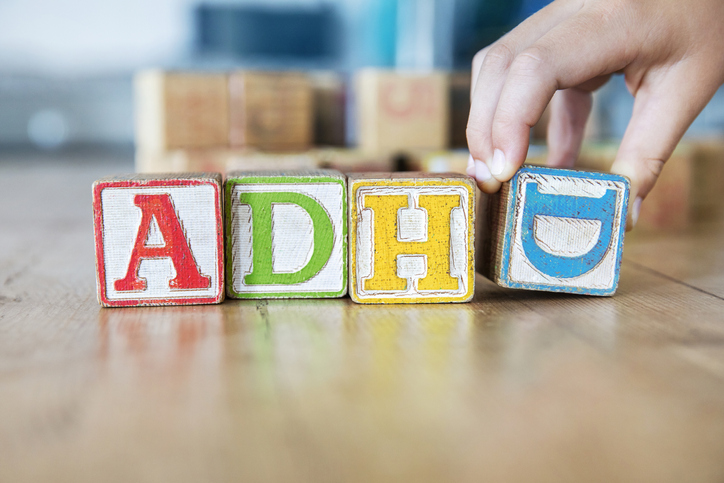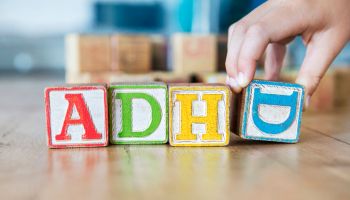
Source: Dimitri Otis / Getty
Let’s talk ADD/ADHD.
The FDA has approved yet another form of methylphenidate, otherwise known as Ritalin, for hyperactive children. The name is Jornay PM.
A child is to take this before bedtime in order to ensure the medication takes effect upon awakening and will not cause disruption to the morning routine. Children age 6 and older can take it between 6:30 and 9:30 PM with adjustments in the timing of the drug made an order to make sure the child is fully drugged in the morning. If you ever wondered how it works, here’s a great explanation. The drug works due to a proprietary technology involving coatings that delay release. The first coating delays release for about 10 hours, and the second coating controls the release of the drugs throughout the following day.
There have been several two phase – 3 randomized, double-blind, placebo controlled studies that have included close to 300 children ages 6 to 12. One trial lasted six weeks, another trial lasted three weeks. Basically a drug versus placebo group. One important factor that cannot be ignored is that these trials take place for 3 to 6 weeks, but children end up taking these for years. The side effects are extremely concerning. Some of the side effects listed, for a child: serious cardiovascular reactions, blood pressure and heart rate increases, psychotic or manic symptoms, priapism (prolonged and painful erection sometimes requiring surgical intervention), peripheral vasculopathy including Raynaud’s Phenomenom (blood circulation issue), long-term suppression of growth, decrease in appetite, weight loss, nausea, abdominal pain, dyspepsia, dry mouth, vomiting, insomnia, anxiety, restlessness, agitation, irritability, dizziness, vertigo, tremors, blurred vision, tachycardia, hyperhydrosis, and pyrexia.
The national poison data system reports thousands of calls to the regional poison control centers are made each year regarding ADHD medications. Reports from 2002-2015 state that 76% were for children 12 years old or younger. In teenagers ages 13 to 19, attempted suicide, abuse, and misuse use accounted for over 50% of episodes. For all ages, 82% of episodes were classified as unintentional, while 42% were a result of inappropriate doses, and there were three deaths. This is alarming and should make us pause.
LIKE US ON FACEBOOK. FOLLOW US ON INSTAGRAM AND TWITTER.
While a prescription drug may appear to be the easy solution in the short term, it definitely could have some negative long-term outcomes. The long-term efficacy of any stimulant medication has not been demonstrated for any domain of a child’s functioning.
At present, there is not one study that has confirmed that chemical imbalances in the brain cause ADHD. There is no objective laboratory test that confirms diagnosis; rather the determination is made by the subjective reporting of parents and teachers, and the subjective evaluation of doctors and mental health professionals. So that may leave consumers questioning diagnoses, or it should.
Geography seems to play a role in the labeling and the drugging regarding ADHD. Example:
The United States ranks #1 in the world for ADD/ADHD in kids and adolescents and 60 times higher than other countries! Why are European countries so much lower? Look at Finland for example. One of the reasons is that the Finns think that primary preschool is for play. Formal education in Finland does not begin until children start grade school. In the United States children have been expected to sit still in a structured situation for longer and longer periods of time and at earlier and earlier ages. Instead of spending their days playing and exploring, as many of us did when we were young, many children are expected to start formal learning as preschoolers.
How about France? Parents in France are very strict about things like bedtimes, amount of screen time, and meal times. Rules are not negotiated with kids, but are issued by parents. Kids do not eat anything they want a meal times are not planned around athletic activities. Children are expected to behave both at meal times in at all times around adults. In France, “no” means “no” and tantrums do not change things. Children learn self-control at an early age. These are just examples to compare and determine the differences.
Let’s look at other possible factors. Some psychiatrists believe it can be many things: lack of discipline or inappropriate discipline, chaotic families, divorce, unhealthy diet, sleep deprivation, lack of exercise to name a few. The problem with these studies is it is impossible to do a blinded study on a dietary pattern since people know what they are eating. The easiest thing to do is an elimination diet for about 4-6 weeks. Eliminate one of the guilty players: processed junk food, sugar, food coloring.
Get Breaking News & Exclusive Contest in Your Inbox:
About 13 years ago, Holly Haze became a health coach in an effort to help her 3 kids (now in college!). Her oldest is on the low end of the spectrum (Asperger’s), her middle child has ADD, and her youngest has an Auditory Processing Disorder. “I saw the slippery slope that some medications caused and quite frankly it scared me. I found the Feingold Diet to help me eliminate triggers in my kids’ daily intake. To this day, they have never been medicated for their conditions”. Holly continues, “There is NO question that I have ADD. I was never tested when I was a kid because it wasn’t a thing. I went home with countless notes saying ‘Holly can’t stay on task. Holly gets distracted. Holly can’t sit still. Holly talks a lot’. Countless notes were sent home. My mom had my IQ and standardized testing done and my results was super high, but I was always struggling and grades were average. This carried on through college and beyond”. She continues, “Hey I’ve been this way for over 50 years. I’m definitely used to it by now. I see no point in taking meds for it now or even getting tested. Would medication have helped me during my schooling? Possibly, but I did ok!”
There are many factors, and even with all of this said, diet is not the only solution for children and adults who suffer from ADD or ADHD. Sleep, hydration, exercise, often therapy are needed. Parents definitely need to be proactive and with our busy lives, that is a challenge.
Some advice from Holly, “Be your own advocate and your child’s advocate. Find a doctor that will listen to you. Medication shouldn’t be the first answer. Diet and lifestyle changes should be attempted”. Holly adds, “It worked for my household. It may not work for you and yours. It takes patience (I am not known for this)and time, but it’s worth a try.”
HEAD BACK TO THE MIX1079.COM HOMEPAGE
THE LATEST:
















